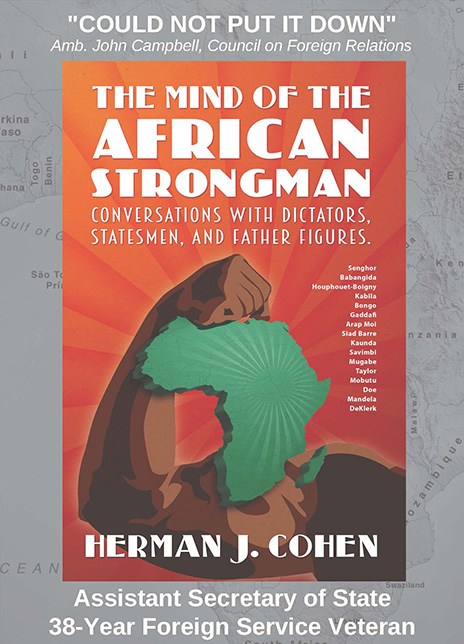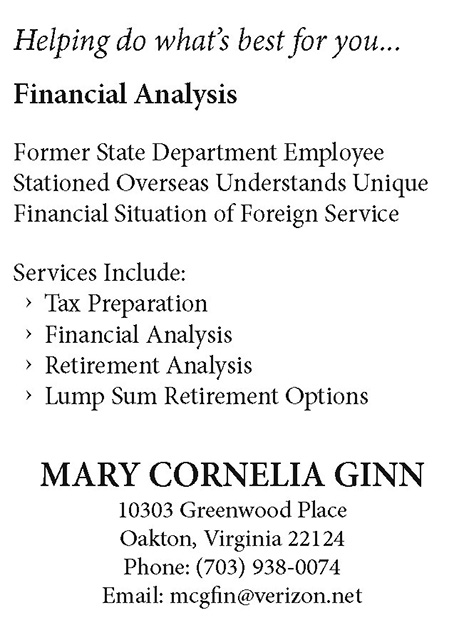#StateToo: Ending Harassment at the State Department
The problem of sexual harassment is persistent and real at State. It’s time for meaningful change.
BY LESLIE BASSETT
“Three departing first-tour female officers asked to meet with three of us senior women at post.
They wanted to know if this first tour was typical of what to expect from a career in the Foreign Service. They asked us if it was appropriate for a married member of the country team to ask junior officers or technical staff out on dates—even if there were no apparent repercussions for saying no.
Was the debate at post over whether members of the country team could frequent a local strip joint that was deemed off-limits for military members of the embassy typical? Is it appropriate for a senior member of the country team to engage in a sexual relationship with an adult dependent of a direct subordinate?”
I joined the Foreign Service in 1982, just a decade after women officers were no longer required to resign upon marriage. During my first tour I rebuffed the advances of a married male superior and—I thought—friend, who showed up uninvited at my home on his birthday, unexpectedly stuck his tongue in my mouth and assumed we would have sex as his present. When I declined, I was excluded from meetings and professional opportunities as he very publicly shunned me at both official and private events. I told no one.
As I worked hard and rose up the ranks, supported by mentors both male and female, I thought the stereotyping receded—though never vanished—in the face of my performance. Until the night when, as deputy chief of mission, I took a late-night phone call from my boss, the ambassador. He was drunk and wanted to know what I was wearing.
At this time, like no other before in our history, the State Department team needs to work as one to defend our institution and the value of diplomacy. The global #MeToo campaign, created by social activist Tarana Burke, highlights just how widespread sexual assault and harassment are in the workplace, and State is no exception. Our institutional culture has tolerated deep-seated prejudices of many kinds, including against women. The problem of sexual harassment and even assault is persistent; it is real; and it needs to be addressed. We can’t wait any longer to make meaningful change.
The “Normal” Work Environment
When I took my oath as an officer, the State Department was in the final throes of its decade-long battle to defeat Alison Palmer’s sex discrimination suit through two different appellate courts, a battle the department finally lost in 1985. Mitigation began, including optional sexual harassment training, but the reception was mixed. (In 1986, Palmer filed a class-action lawsuit that wasn’t settled until 2010.) Many thought that the rising numbers of women in the State Department would promote institutional change.
I thought so too. But as I progressed in my career, I found that sexual harassment and stereotyping was part of the “normal” work environment. I hoped that competence, good performance and exemplary conduct would challenge the bias ingrained in State’s culture. I corrected colleagues when I could, offered mentoring to others, and tried to be the change I wanted to see in the world. But even as bias and harassment continued, I made no formal complaints. I learned to shrug it off, make a joke and avoid the troublemakers. But I said nothing. In an institution where “corridor reputation” drives assignments and opportunity, the cost of being a troublemaker was high, and the professional consequences grave.
In an institution where “corridor reputation” drives assignments and opportunity, the cost of being a troublemaker was high, and the professional consequences grave.
I wasn’t alone. In 1992 the State Department released results of a survey on sexual harassment in which 51 percent of the 4,000 American Foreign Service employees who responded described it as “a problem for both males and females.” Thirty-four percent of respondents agreed they would be labeled a “troublemaker” if they reported inappropriate comments, gestures or touching, while 38 percent said they would not report it. Some 18 percent of female and 4 percent of male respondents claimed to have actually experienced harassment at the department.
“I have a co-worker who almost every time we interact feels the need to remind me that he thinks we should date because I have ‘a nice ass’—despite the fact that I made it clear that I am not interested years ago.”
Since then women have made progress both in promotions and influence, in many cases thanks to the support and mentoring of both female and male colleagues. Yet when I joined the more than 200 women who signed the November 2017 letter protesting sexual harassment in the national security sector—#metoonatsec—I wasn’t looking backward at my career. I was looking directly at what is happening now in the Department of State. These leading foreign policy experts, academics and practitioners, including 112 former or current State Department colleagues, noted, “We, too, are survivors of sexual harassment, assault and abuse or know others who are.”
A Complex Process
Part of the problem in dealing with sexual harassment is the fact that the State Department’s disciplinary system is “complex and somewhat disjointed,” as a November 2014 Office of the Inspector General report, “Review of the Department of State Disciplinary Process,” put it. As OIG noted, the process “can involve a half dozen department offices and non-department agencies, department and non-department appeals entities and investigative entities, private attorneys, unions and professional associations, and the charged employee.”
“I volunteered to escort congressional delegation members to the airport as they were departing from an official visit to post. I arrived at their hotel on a Saturday morning about half an hour before our scheduled departure and was waiting in the lobby when I noticed the congressman at the bar. I went over and introduced myself, and let him know that we needed to leave in 30 minutes.
He put his arm around my shoulder and asked if I wanted a drink. ‘No, thank you,’ I told him and tried to pull away. He pulled me closer, wrapped his arm a little tighter and said, more insistently, ‘C’mon, have a cocktail. He can put orange juice in it; it’s like breakfast.’ I declined again and pulled away more firmly.
After several refusals, and his continued insistence, I finally said, ‘I can’t drink. I’m still nursing my youngest.’ With his hand still on my arm, he turned to me, pulled me closer, looked pointedly down my shirt and said, ‘Oh yeah, wow, I can see that.’”
The Office of Civil Rights (S/OCR) is the starting point for complaints of harassment or discrimination on the basis of gender, race, age or other identity factors. S/OCR handles formal complaints filed under the Equal Employment Opportunity law, in addition to overseeing the administrative inquiry process that is required when the office receives any allegation of sexual or racial harassment. Formal EEO complaints, which carry a much higher burden of proof, are fewer. But under the FAM any allegation of sexual (or racial) harassment can and must be reported to S/OCR, and that office is mandated to conduct an administrative inquiry into the allegations that could lead to disciplinary action.
On receiving a complaint of sexual or racial harassment, S/OCR conducts an investigation and, in turn, submits a “Report of Investigation,” without a recommendation, for evaluation and action to four offices: (1) Human Resources/Employee Relations/Conduct, Suitability and Discipline (HR/ER/CSD); (2) Diplomatic Security; (3) the executive office of the relevant bureau; and (4) post management, depending on the complainant’s location and hiring category. Sexual assault complaints, which are matters of criminal law, are referred immediately to DS for investigation, and DS handles any other complaints that have security clearance implications.
During the last several years cases pursued and disciplinary action taken through the administrative inquiry process have increased significantly. In the last five years the Foreign Service Grievance Board (the last forum for appeal of department administrative sanctions by members of the Foreign Service) has denied appeals filed by employees facing discipline for inappropriate comments, inappropriate behavior and poor judgment. Such cases have involved, for instance, an officer who “made sexually inappropriate remarks and engaged in offensive touching behaviors”; an officer whose unwanted attentions drove a locally employed (LE) staff member to seek resignation; an engineer who harassed a contractor; and a management officer who harassed LE staff, local contract staff and household staff. Generally the grievants in these cases outranked their victim(s).
While the department is cracking down on inappropriate sexual comments, language and behavior, nothing has been done to shield the complainants or victims from gossip, professional repercussions and potentially more serious consequences. Further, the OIG report on State’s disciplinary process cited previously noted—though acknowledging efforts to address the issue—that as of November 2014 the lack of consistent, common tracking and reporting across the disciplinary system could result in a wide variation in times to resolution and consistent statements of decision.
The combination of complex processes, inadequate accountability at senior levels, a lack of training and other issues means that repeat offenders can continue to abuse.
A Clear Mandate for Change
In June 2015, the Office of the Inspector General reported that while formal sexual harassment complaints had almost tripled from 88 in Fiscal Year 2011 to 248 in Fiscal Year 2014, there was a need for senior department officials to “emphasize the need for timely action” and “hold individuals accountable” in these cases. In its report, “Inspection of the Office of Civil Rights,” the OIG also pointed to the lack of mandatory harassment training for all employees.
The combination of complex processes, inadequate accountability at senior levels, a lack of training and other issues means that repeat offenders can continue to abuse.
The November 2014 OIG report on State’s disciplinary process cited previously had also found that there was a lack of supervisor accountability for employee misconduct related to sexual harassment, that guides for supervisors in handling misconduct needed updating, that there was no policy requiring recusal of key offices involved in assault or harassment investigations when the accused was one of their own, and that the department at various levels delayed at least some investigations into sexual assault or misbehavior. The OIG recommended, among other things, that HR revise the Decision Criteria for Tenure and Promotion in the Foreign Service to include the responsibility to deal with misconduct. The OIG also made a number of recommendations to improve procedures, including full implementation of a common tracking and reporting system.
“Principal deputy assistant secretary visiting post: married, male, 50s. After a no-host dinner and drinks with embassy staff, he says to me, the control officer, ‘OK, it’s time to go to bed’—in front of everyone. His staffer (male, 30s, Civil Service) and I went in motor pool car to take him back to hotel. Men in back, me up front with driver. Halfway to hotel, PDAS claps me on shoulder and says, ‘Hey, where are the girls around here? Oh wait, you won’t know that.’”
State has taken too long to address these challenges. It was not until December 2015 that DS security clearance questionnaires provided an exemption for survivors of sexual assault who had sought mental health counseling related to their attack. (They no longer need to disclose that they sought counseling.) And although regulations and internal standard operating procedures concerning sexual assaults involving chief-of-mission personnel and facilities outside the United States have been in place for some time, particularly on the DS side, as of June 2017 they were for the first time brought together as a comprehensive, standalone provision of the Foreign Affairs Manual (3 FAM 1710).
Now the global #MeToo campaign has intensified the spotlight on the problem. And in Jan. 12 remarks to State Department colleagues, Secretary of State Rex Tillerson specifically spoke out against sexual harassment, enjoined supervisors to ensure respectful workplaces and promised that worldwide sexual harassment training would be completed by June 1 of this year. On Jan. 17, Senators Ben Cardin (D-Md.) and Jeanne Shaheen (D-N.H.) of the Senate Foreign Relations Committee sent a letter to Secretary Tillerson and USAID Administrator Mark Green regarding sexual harassment and abuse in the agencies, noting: “These incidents and the pervasive culture that all too frequently excuses these behaviors and actions have had serious and detrimental consequences for the careers and lives of those affected and, by depriving the United States of the service of some of our best and brightest, a deep and negative effect on our national security.”
The mandate is clear.
What State Must Do
“While I was serving overseas, a male Civil Service colleague thought nothing of engaging a high-level foreign counterpart on what was then his recently acquired online girlfriend. This took place during an official meeting, and the central part of their conversation was how women [of a certain ethnicity] have small vaginas so the sex is better. This included the counterpart making a small ‘o’ hand signal to illustrate his perception.”
The State Department should adopt and implement a “no tolerance” policy for sexual harassment, abuse and assault. It should create a special committee, which includes representation from various hiring categories, ranks and bureaus, to investigate all forms of sexual harassment within the State Department and create actionable recommendations on institutional reform within a reasonable time-frame. To provide institutional remedies:
- Fully implement the policies on sexual harassment and sexual assault.
- Update employee handbooks.
- Require mandatory, ongoing sexual harassment training.
- Hold supervisors accountable for maintaining respectful workplaces.
- Ensure prompt processing of harassment/assault complaints by responsible offices.
- Establish a recusal policy for HR, DS, the Bureau of Medical Services and OIG when asked to investigate harassment or assault by their own employees.
- Improve resources and support for employees, family members, LE staff and contractors who face sexual harassment or assault.
- Create a separate, confidential and responsive channel for victims to report sexual assault and receive physical and mental support.
- Impose transparent penalties against perpetrators that factor in the severity and frequency of the harassment, including penalties such as suspension, criminal charges, revocation of security clearance and separation.
- Provide statistical information on complaints and outcomes.
- Conduct vigorous and timely investigations of sexual assault reports and provide accurate statistical reporting of cases/timelines/outcomes.
- Reinvigorate the Federal Women’s Program at all State facilities.
What You Can Do
Each of us must do our part to make safe, respectful workplaces the norm in the State Department’s many outposts in the United States and around the world:
- Firmly protest and report discrimination, harassment, abuse and stereotyping—not only when it happens to you, but also when it happens to anyone else.
- Recognize that assault happens and take active measures to support and protect assault victims.
- Proactively contribute to a workplace environment that empowers everyone. Reject off-color jokes, discussion about physical attributes, stereotyping and labeling.
- Be alert to power dynamics that underlie harassment.
- Treat everyone with the respect you would like to receive from them.
It’s time for us to start talking to one another, supporting one another and building a workforce where everyone feels heard, respected and safe. It’s time to change the habits that are making us weaker at a time when American diplomacy needs our united strength and commitment.
















